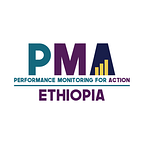PMA Ethiopia Research Mentorship Program: Mentee Spotlight
The PMA Ethiopia mentorship program builds research skills of PhD students from universities based in Ethiopia who are completing their PhD in public health. The program links PhD students to faculty at the Johns Hopkins University Bloomberg School of Public Health (JHBSPH) in the U.S., and faculty provide guidance on development of their research proposal and completion of dissertation research. The overall goal of the mentorship program is to build the research skills of Ethiopian PhD students in order to prepare them to engage in scientific research and knowledge generation in the field of public health.
This blog is part of series of posts featuring mentees of the second cohort to the PMA Ethiopia research mentorship program. In this post we will be featuring Jote Markos Cafo.
Name: Jote Markos Cafo
University: Second year PhD student at Wollega University, Ethiopia
Faculty mentor: Dr. Shannon N. Wood
Dissertation topic: Intimate partner violence (IPV) during pregnancy and its impact on maternal health and maternal health service utilization. Most of the studies from were single cross-sectional studies, studies in clinical settings. Additionally, it is unclear as what factors differentiate groups of women in their locations across the regions of Ethiopia and how IPV during pregnancy can affect maternal health and maternal health service utilization. Therefore, this study aimed to assess IPV during pregnancy and it effect on maternal health and maternal health services utilization using longitudinal national level PMA-Ethiopia data that was generated using validated and tested tools, and assessed all types of intimate partner violence.
Our work examines prevalence of IPV during pregnancy across all regions of Ethiopia. This dissertation will use a mixed methods approach to assess maternal health impacts of IPV during pregnancy. Qualitative data will be collected from women who have lived experiences of IPV during pregnancy. Quantitative data will come from the PMA Ethiopia cohort datasets of pregnant and postpartum women.
What do you expect to gain from and accomplish during your participation in the mentorship program?
This mentorship program complements and strengthens, in my opinion, the Ph.D. program that I am enrolled in. As I am part of the first cohort in the PhD program at Wollega University I feel that my participation in the mentorship program has impactful and meaningful contributions for my PhD program.
From the mentorship program, I benefit tremendously from close supervision of JHBSPH faculty members, learning appropriate analysis techniques for analysis of nationally representative data. The program is helping me to gain knowledge, experience and skills in data analysis and research methods. Additionally, through the program I was given opportunity to take online summer courses at JHBSPH and this too has helped me for my work. Furthermore, I am also expecting to establish and grow my professional network and create institutional linkages between my university and JHBSPH. I am confident that this mentorship program can impact my professional career beyond the dissertation work.
What are your plans after the mentorship?
After completion of the mentorship program, I plan to strengthen the public health department. As one of the first students in the Ph.D. program at the department and I plan to share my experience with junior students. After successful completion of my PhD, I plan to continue working on research and supervising public health students at the Masters and Ph.D. level. I hope to continue to participate in national level research and lead and contribute to evidence-based research used to inform policy regarding public health, while building on my new connections and research partnerships.
